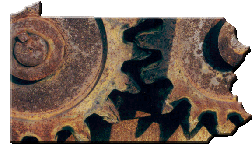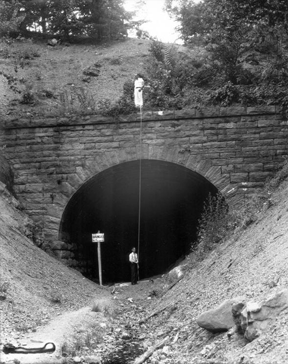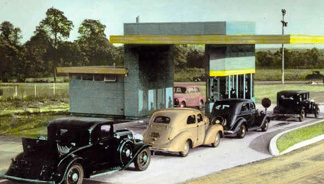It's time for the Pennsylvania Turnpike
Commission to hit the road
by Bill Keisling
(Editor's note: This essay was published as an op-ed piece by the Pittsburgh Post-Gazette on April 1, 2007, and also by the Johnstown [PA] Tribune-Democrat on March 23, 2007. Posted here on April 15, 2007.)
The Pennsylvania Turnpike Commission is an obsolete and out-of-touch political patronage graveyard that should be abolished. The toll road itself should be responsibly leased to private enterprise.
The proceeds of the lease should not go to the coffers of the political parties. It should not be used finance no-bid bond and non-competitive legal work. Nor should it mostly be used to rebuild the rusted bridges and roadways of our carbon-based past.
The windfall should serve as a down payment for a modern, high-speed rail system running between Philadelphia, Harrisburg, State College and Pittsburgh. In this way we can leverage a great nineteenth century failure, and a popular twentieth century success, into a revolutionary twenty-first century transportation system for our commonwealth.
The Tuscarora Tunnel was one of six uncompleted 19th century tunnels used to build the PA turnpike. Click image or here to enlarge.
The history of the Pennsylvania Turnpike is deeply entwined with the history of Pennsylvania. The turnpike was a Roosevelt-era WPA work project. In the 1930s, when the turnpike was proposed, a major selling point was that it could be built along the path of an abandoned nineteenth century rail and tunnel corridor across the Allegheny mountains.
Why was this rail corridor partially built, only to be abandoned in the nineteenth century? It's a story of one of Pennsylvania's greatest failures.
By the early 1800s, Philadelphia had grown into America's premier city and port. All that changed in 1825, with the opening of the Erie Canal -- called by some DeWitt Clinton's folly.
New York's Erie Canal allowed westward expansion, swelled New York City's population, and soon relegated Philadelphia's port and cultural centers to second-class status.
Hoping to reverse this trend and to compete with New York's canal and rail lines, nineteenth century Pennsylvanians belatedly launched a number of schemes to haul freight and people across the commonwealth's western mountain barrier. All were too little, and too late. From these efforts came the abandoned rail tunnels through the Alleghenies. In the late 1930s, those abandoned tunnels were used to jump start the Pennsylvania turnpike.
The toll road was an immediate success. Pennsylvanians -- and Americans -- quickly fell in love with the turnpike. As America's first limited-access superhighway, it changed America, and Americans.
Even so, the PA turnpike was always about jobs and political patronage. The Pennsylvania Turnpike Commission -- the agency overseeing the roadway -- from its inception was devised to evenly split the spoils between the two political parties.
For decades, if you wanted a job on the Pennsylvania turnpike, you were obliged to turn over a portion of your pay to the ruling party's patronage boss. When I wrote my 1993 book When the Levee Breaks: The Patronage Crisis at the Pennsylvania Turnpike, I was still able to interview a few retired turnpike workers who recalled forking over $50, twice a year, to the pols.
The PA turnpike immediately caught the public's imagination. Here cars pass through an original toll booth. Click photo or here to enlarge.
These legalized kick-back practices were gradually whittled away by court decisions in the 1970s, 80s and 90s. The real money thereafter made by the pols came not from lunch bucket jobs but from what's come to be called "Pinstripe Patronage."
Bond underwriters, bond solicitors and others received extremely lucrative, no-bid turnpike contracts, and in return tendered big contributions to their political sponsors. In the 1980s, during the administration of Gov. Richard Thornburgh, one piece of turnpike legislation was even called "The Noah's Ark Deal," because beneficiaries included "two of everyone" -- a bond underwriter and solicitor for each political party.
In the 1990s, reform-minded state lawmakers like Rep. Pat Carone (R-Mars, PA) held hearings about these and other deeply embedded turnpike patronage practices. Those of us interested in reform came to recognize Pinstripe Patronage as even more corrupting than lunch bucket patronage. Widespread calls were made for competitive bonding and legal practices.
All these proposed reforms were arrogantly ignored by the Pennsylvania Turnpike Commission. Those seeking a fair crack at a job were forced to hire a lawyer and go to court, while turnpike attorneys threatened reformers and writers (this writer included) with jail. More recently, the Commission has refused to investigate serious security concerns on the roadway.
That's why the Pennsylvania Turnpike Commission should now be abolished. The roadway should be leased on a competitive bid basis. The public should be promised that the tolls will only be increased in a predictable and reasonable manner. And yes, the bulk of the proceeds should be used to build a state-of-the-art, high-speed rail system, running from Philadelphia to Pittsburgh.
The proceeds of the turnpike lease should not be used to convert rusty four-lane bridges in Pittsburgh and other places into rusty six-lane bridges that further pollute our planet and grow our dependence on cars.
By abolishing the Pennsylvania Turnpike Commission, the great failures, and the dazzling successes, of our past can be leveraged to once again provide transportation leadership for the rest of the United States.
By abolishing the turnpike commission, we'll also send a clear signal to other complacent state agencies: We are serious about change.
Who's next on the hit list? The Pennsylvania Liquor Control Board should go. Pennsylvania's court system -- long the laughingstock of the nation -- needs overhauled. Our 501 school districts need consolidation.
And, yes, the Pennsylvania legislature should be downsized.
It's time we move ahead, or we'll remain forever stuck, like those motorists stranded in a fifty-mile-long traffic jam on Interstate 78 this winter.
by Bill Keisling


